Enterprise Resource Planning (ERP) Systems: A Comparative Analysis
VerifiedAdded on 2021/06/17
|14
|4433
|112
Report
AI Summary
This report provides a comprehensive overview of Enterprise Resource Planning (ERP) systems, comparing and contrasting on-premise, hosted, and cloud-based solutions. It begins with an introduction to ERP systems and their importance in modern business operations. The report then delves into the specifics of each system type, discussing their characteristics, benefits, and risks. On-premise ERP is presented as a traditional approach with high security but limited flexibility. Hosted ERP is examined as an off-premise solution offering lower upfront costs and faster IT functions. Cloud ERP is highlighted as a subscription-based model with lower operating costs and accessibility. The report includes real-world examples, such as Sarmed Logistics and Cadbury, to illustrate the practical application of these systems. Furthermore, the report offers a comparative analysis of the three ERP systems, concluding with a discussion on which system is most suitable for different business needs. The report also discusses the benefits and risks of each system, including security concerns, technical difficulties, and vulnerability issues.
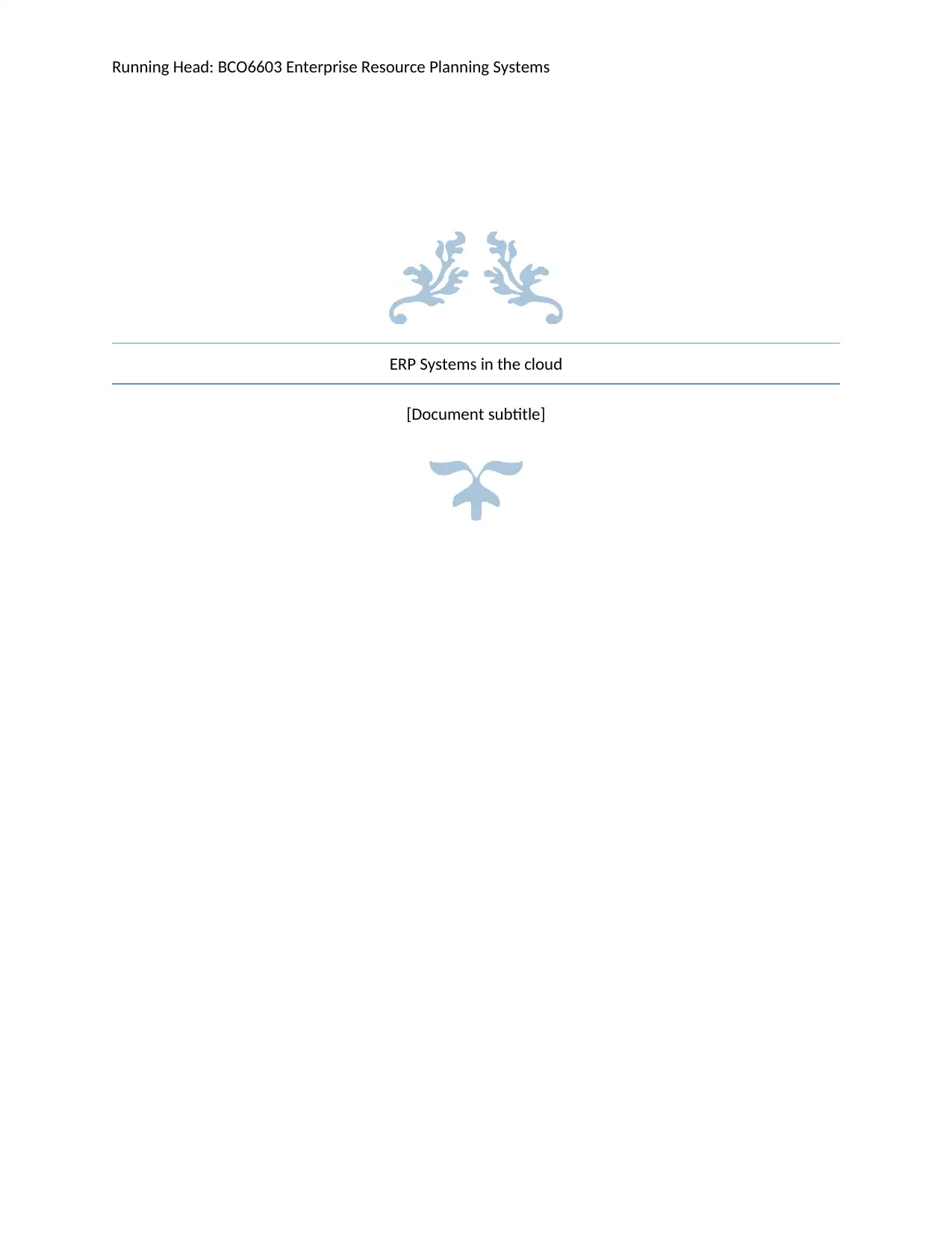
Running Head: BCO6603 Enterprise Resource Planning Systems
ERP Systems in the cloud
[Document subtitle]
ERP Systems in the cloud
[Document subtitle]
Paraphrase This Document
Need a fresh take? Get an instant paraphrase of this document with our AI Paraphraser
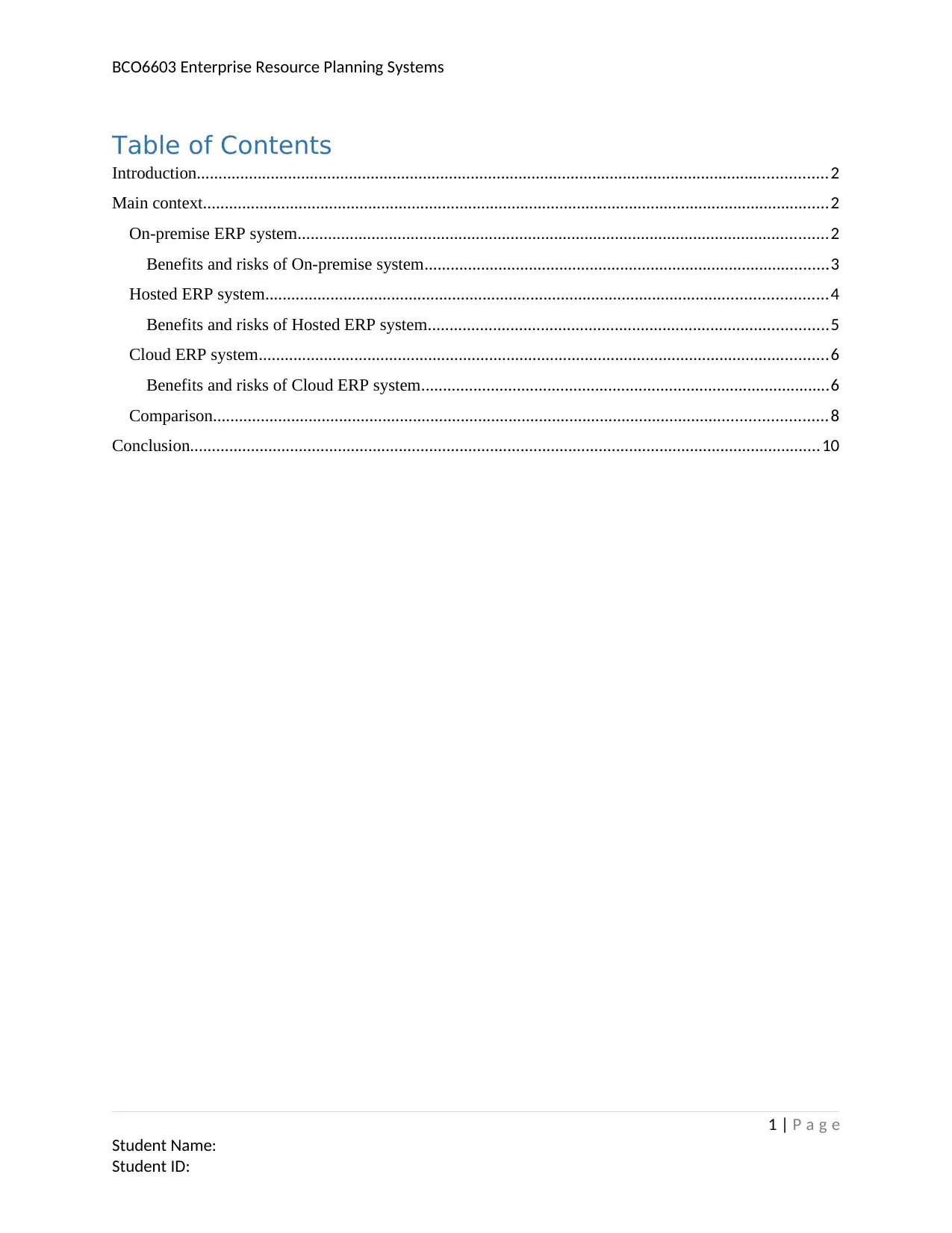
BCO6603 Enterprise Resource Planning Systems
Table of Contents
Introduction.................................................................................................................................................2
Main context................................................................................................................................................2
On-premise ERP system..........................................................................................................................2
Benefits and risks of On-premise system.............................................................................................3
Hosted ERP system.................................................................................................................................4
Benefits and risks of Hosted ERP system............................................................................................5
Cloud ERP system...................................................................................................................................6
Benefits and risks of Cloud ERP system..............................................................................................6
Comparison.............................................................................................................................................8
Conclusion.................................................................................................................................................10
1 | P a g e
Student Name:
Student ID:
Table of Contents
Introduction.................................................................................................................................................2
Main context................................................................................................................................................2
On-premise ERP system..........................................................................................................................2
Benefits and risks of On-premise system.............................................................................................3
Hosted ERP system.................................................................................................................................4
Benefits and risks of Hosted ERP system............................................................................................5
Cloud ERP system...................................................................................................................................6
Benefits and risks of Cloud ERP system..............................................................................................6
Comparison.............................................................................................................................................8
Conclusion.................................................................................................................................................10
1 | P a g e
Student Name:
Student ID:
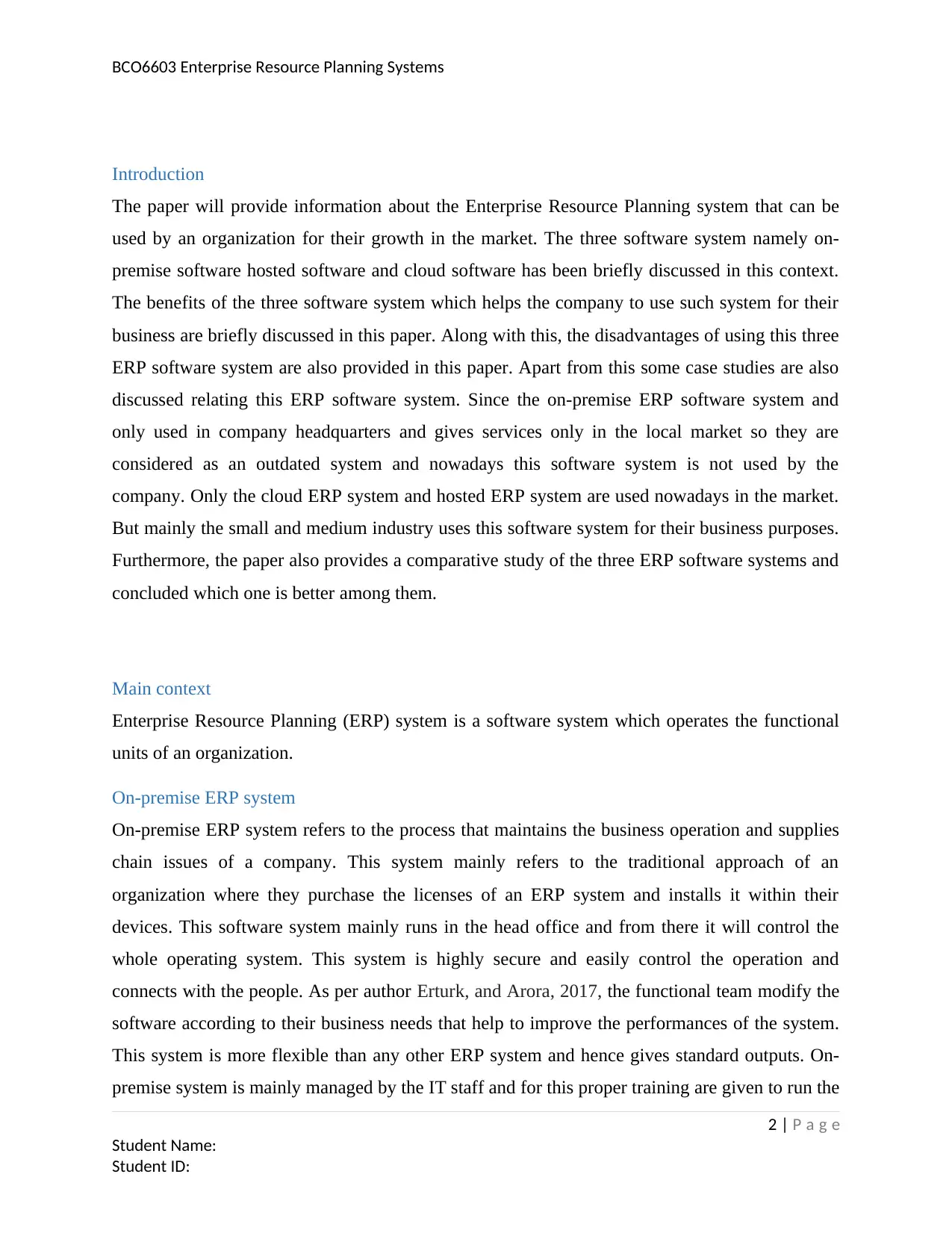
BCO6603 Enterprise Resource Planning Systems
Introduction
The paper will provide information about the Enterprise Resource Planning system that can be
used by an organization for their growth in the market. The three software system namely on-
premise software hosted software and cloud software has been briefly discussed in this context.
The benefits of the three software system which helps the company to use such system for their
business are briefly discussed in this paper. Along with this, the disadvantages of using this three
ERP software system are also provided in this paper. Apart from this some case studies are also
discussed relating this ERP software system. Since the on-premise ERP software system and
only used in company headquarters and gives services only in the local market so they are
considered as an outdated system and nowadays this software system is not used by the
company. Only the cloud ERP system and hosted ERP system are used nowadays in the market.
But mainly the small and medium industry uses this software system for their business purposes.
Furthermore, the paper also provides a comparative study of the three ERP software systems and
concluded which one is better among them.
Main context
Enterprise Resource Planning (ERP) system is a software system which operates the functional
units of an organization.
On-premise ERP system
On-premise ERP system refers to the process that maintains the business operation and supplies
chain issues of a company. This system mainly refers to the traditional approach of an
organization where they purchase the licenses of an ERP system and installs it within their
devices. This software system mainly runs in the head office and from there it will control the
whole operating system. This system is highly secure and easily control the operation and
connects with the people. As per author Erturk, and Arora, 2017, the functional team modify the
software according to their business needs that help to improve the performances of the system.
This system is more flexible than any other ERP system and hence gives standard outputs. On-
premise system is mainly managed by the IT staff and for this proper training are given to run the
2 | P a g e
Student Name:
Student ID:
Introduction
The paper will provide information about the Enterprise Resource Planning system that can be
used by an organization for their growth in the market. The three software system namely on-
premise software hosted software and cloud software has been briefly discussed in this context.
The benefits of the three software system which helps the company to use such system for their
business are briefly discussed in this paper. Along with this, the disadvantages of using this three
ERP software system are also provided in this paper. Apart from this some case studies are also
discussed relating this ERP software system. Since the on-premise ERP software system and
only used in company headquarters and gives services only in the local market so they are
considered as an outdated system and nowadays this software system is not used by the
company. Only the cloud ERP system and hosted ERP system are used nowadays in the market.
But mainly the small and medium industry uses this software system for their business purposes.
Furthermore, the paper also provides a comparative study of the three ERP software systems and
concluded which one is better among them.
Main context
Enterprise Resource Planning (ERP) system is a software system which operates the functional
units of an organization.
On-premise ERP system
On-premise ERP system refers to the process that maintains the business operation and supplies
chain issues of a company. This system mainly refers to the traditional approach of an
organization where they purchase the licenses of an ERP system and installs it within their
devices. This software system mainly runs in the head office and from there it will control the
whole operating system. This system is highly secure and easily control the operation and
connects with the people. As per author Erturk, and Arora, 2017, the functional team modify the
software according to their business needs that help to improve the performances of the system.
This system is more flexible than any other ERP system and hence gives standard outputs. On-
premise system is mainly managed by the IT staff and for this proper training are given to run the
2 | P a g e
Student Name:
Student ID:
⊘ This is a preview!⊘
Do you want full access?
Subscribe today to unlock all pages.

Trusted by 1+ million students worldwide
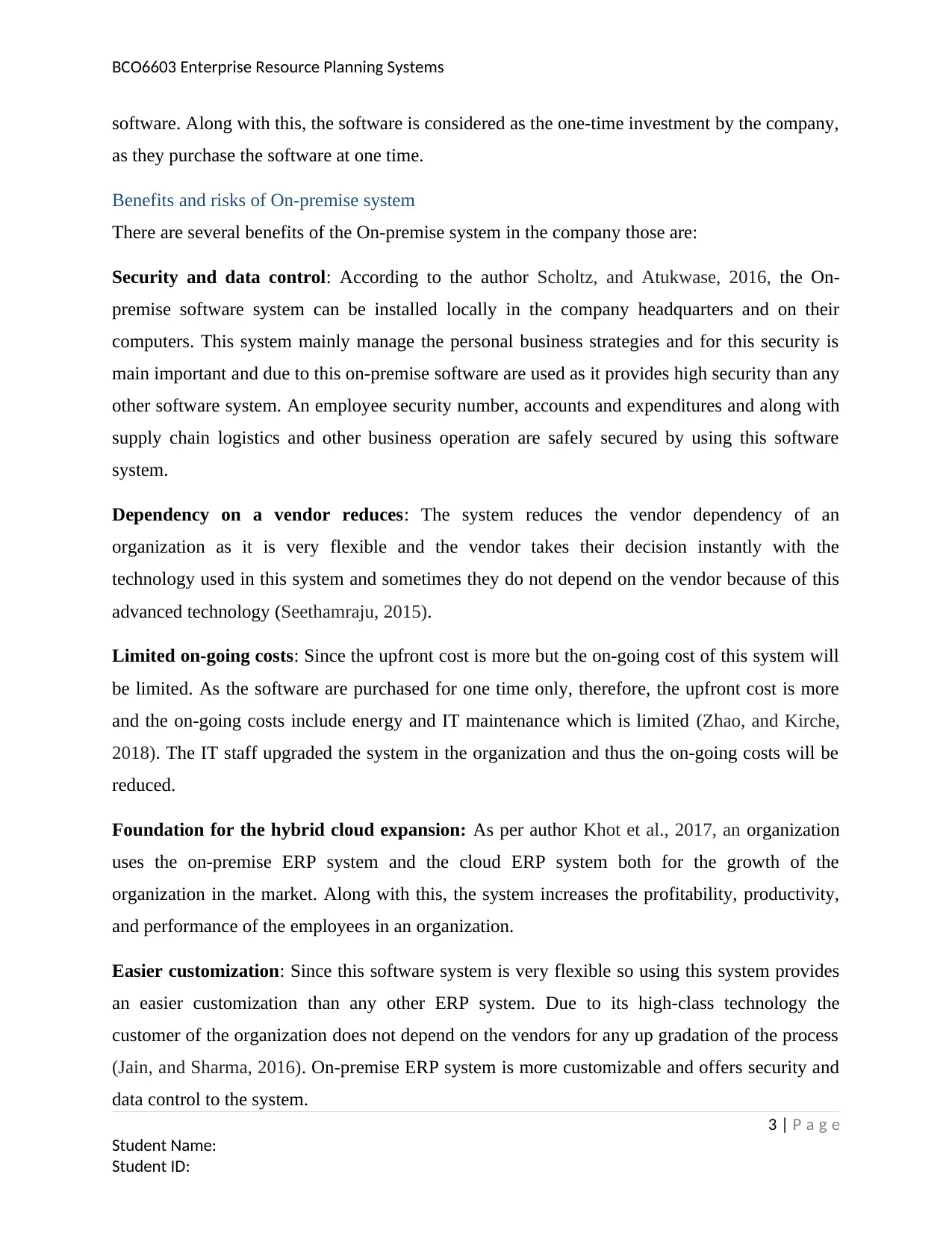
BCO6603 Enterprise Resource Planning Systems
software. Along with this, the software is considered as the one-time investment by the company,
as they purchase the software at one time.
Benefits and risks of On-premise system
There are several benefits of the On-premise system in the company those are:
Security and data control: According to the author Scholtz, and Atukwase, 2016, the On-
premise software system can be installed locally in the company headquarters and on their
computers. This system mainly manage the personal business strategies and for this security is
main important and due to this on-premise software are used as it provides high security than any
other software system. An employee security number, accounts and expenditures and along with
supply chain logistics and other business operation are safely secured by using this software
system.
Dependency on a vendor reduces: The system reduces the vendor dependency of an
organization as it is very flexible and the vendor takes their decision instantly with the
technology used in this system and sometimes they do not depend on the vendor because of this
advanced technology (Seethamraju, 2015).
Limited on-going costs: Since the upfront cost is more but the on-going cost of this system will
be limited. As the software are purchased for one time only, therefore, the upfront cost is more
and the on-going costs include energy and IT maintenance which is limited (Zhao, and Kirche,
2018). The IT staff upgraded the system in the organization and thus the on-going costs will be
reduced.
Foundation for the hybrid cloud expansion: As per author Khot et al., 2017, an organization
uses the on-premise ERP system and the cloud ERP system both for the growth of the
organization in the market. Along with this, the system increases the profitability, productivity,
and performance of the employees in an organization.
Easier customization: Since this software system is very flexible so using this system provides
an easier customization than any other ERP system. Due to its high-class technology the
customer of the organization does not depend on the vendors for any up gradation of the process
(Jain, and Sharma, 2016). On-premise ERP system is more customizable and offers security and
data control to the system.
3 | P a g e
Student Name:
Student ID:
software. Along with this, the software is considered as the one-time investment by the company,
as they purchase the software at one time.
Benefits and risks of On-premise system
There are several benefits of the On-premise system in the company those are:
Security and data control: According to the author Scholtz, and Atukwase, 2016, the On-
premise software system can be installed locally in the company headquarters and on their
computers. This system mainly manage the personal business strategies and for this security is
main important and due to this on-premise software are used as it provides high security than any
other software system. An employee security number, accounts and expenditures and along with
supply chain logistics and other business operation are safely secured by using this software
system.
Dependency on a vendor reduces: The system reduces the vendor dependency of an
organization as it is very flexible and the vendor takes their decision instantly with the
technology used in this system and sometimes they do not depend on the vendor because of this
advanced technology (Seethamraju, 2015).
Limited on-going costs: Since the upfront cost is more but the on-going cost of this system will
be limited. As the software are purchased for one time only, therefore, the upfront cost is more
and the on-going costs include energy and IT maintenance which is limited (Zhao, and Kirche,
2018). The IT staff upgraded the system in the organization and thus the on-going costs will be
reduced.
Foundation for the hybrid cloud expansion: As per author Khot et al., 2017, an organization
uses the on-premise ERP system and the cloud ERP system both for the growth of the
organization in the market. Along with this, the system increases the profitability, productivity,
and performance of the employees in an organization.
Easier customization: Since this software system is very flexible so using this system provides
an easier customization than any other ERP system. Due to its high-class technology the
customer of the organization does not depend on the vendors for any up gradation of the process
(Jain, and Sharma, 2016). On-premise ERP system is more customizable and offers security and
data control to the system.
3 | P a g e
Student Name:
Student ID:
Paraphrase This Document
Need a fresh take? Get an instant paraphrase of this document with our AI Paraphraser
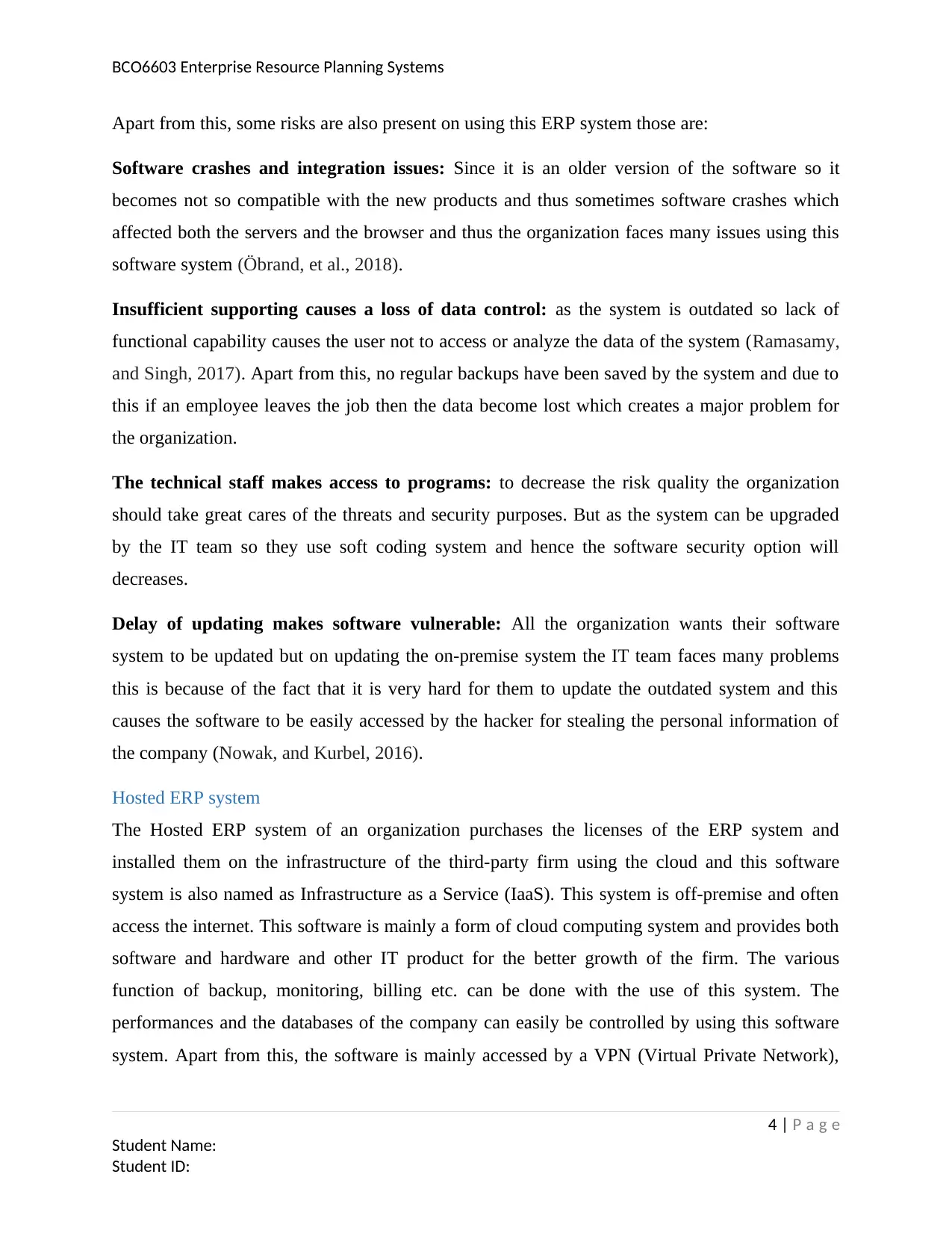
BCO6603 Enterprise Resource Planning Systems
Apart from this, some risks are also present on using this ERP system those are:
Software crashes and integration issues: Since it is an older version of the software so it
becomes not so compatible with the new products and thus sometimes software crashes which
affected both the servers and the browser and thus the organization faces many issues using this
software system (Öbrand, et al., 2018).
Insufficient supporting causes a loss of data control: as the system is outdated so lack of
functional capability causes the user not to access or analyze the data of the system (Ramasamy,
and Singh, 2017). Apart from this, no regular backups have been saved by the system and due to
this if an employee leaves the job then the data become lost which creates a major problem for
the organization.
The technical staff makes access to programs: to decrease the risk quality the organization
should take great cares of the threats and security purposes. But as the system can be upgraded
by the IT team so they use soft coding system and hence the software security option will
decreases.
Delay of updating makes software vulnerable: All the organization wants their software
system to be updated but on updating the on-premise system the IT team faces many problems
this is because of the fact that it is very hard for them to update the outdated system and this
causes the software to be easily accessed by the hacker for stealing the personal information of
the company (Nowak, and Kurbel, 2016).
Hosted ERP system
The Hosted ERP system of an organization purchases the licenses of the ERP system and
installed them on the infrastructure of the third-party firm using the cloud and this software
system is also named as Infrastructure as a Service (IaaS). This system is off-premise and often
access the internet. This software is mainly a form of cloud computing system and provides both
software and hardware and other IT product for the better growth of the firm. The various
function of backup, monitoring, billing etc. can be done with the use of this system. The
performances and the databases of the company can easily be controlled by using this software
system. Apart from this, the software is mainly accessed by a VPN (Virtual Private Network),
4 | P a g e
Student Name:
Student ID:
Apart from this, some risks are also present on using this ERP system those are:
Software crashes and integration issues: Since it is an older version of the software so it
becomes not so compatible with the new products and thus sometimes software crashes which
affected both the servers and the browser and thus the organization faces many issues using this
software system (Öbrand, et al., 2018).
Insufficient supporting causes a loss of data control: as the system is outdated so lack of
functional capability causes the user not to access or analyze the data of the system (Ramasamy,
and Singh, 2017). Apart from this, no regular backups have been saved by the system and due to
this if an employee leaves the job then the data become lost which creates a major problem for
the organization.
The technical staff makes access to programs: to decrease the risk quality the organization
should take great cares of the threats and security purposes. But as the system can be upgraded
by the IT team so they use soft coding system and hence the software security option will
decreases.
Delay of updating makes software vulnerable: All the organization wants their software
system to be updated but on updating the on-premise system the IT team faces many problems
this is because of the fact that it is very hard for them to update the outdated system and this
causes the software to be easily accessed by the hacker for stealing the personal information of
the company (Nowak, and Kurbel, 2016).
Hosted ERP system
The Hosted ERP system of an organization purchases the licenses of the ERP system and
installed them on the infrastructure of the third-party firm using the cloud and this software
system is also named as Infrastructure as a Service (IaaS). This system is off-premise and often
access the internet. This software is mainly a form of cloud computing system and provides both
software and hardware and other IT product for the better growth of the firm. The various
function of backup, monitoring, billing etc. can be done with the use of this system. The
performances and the databases of the company can easily be controlled by using this software
system. Apart from this, the software is mainly accessed by a VPN (Virtual Private Network),
4 | P a g e
Student Name:
Student ID:
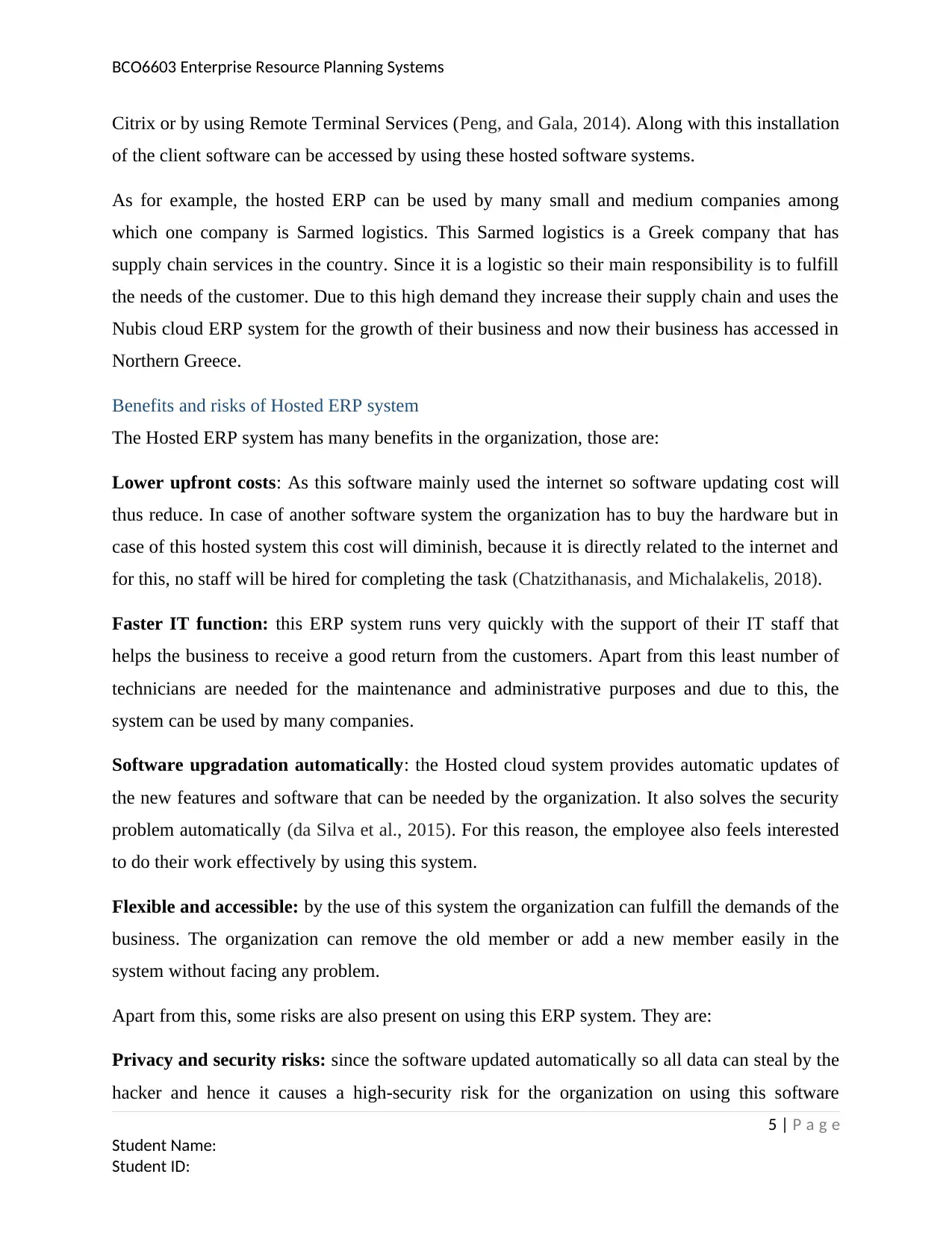
BCO6603 Enterprise Resource Planning Systems
Citrix or by using Remote Terminal Services (Peng, and Gala, 2014). Along with this installation
of the client software can be accessed by using these hosted software systems.
As for example, the hosted ERP can be used by many small and medium companies among
which one company is Sarmed logistics. This Sarmed logistics is a Greek company that has
supply chain services in the country. Since it is a logistic so their main responsibility is to fulfill
the needs of the customer. Due to this high demand they increase their supply chain and uses the
Nubis cloud ERP system for the growth of their business and now their business has accessed in
Northern Greece.
Benefits and risks of Hosted ERP system
The Hosted ERP system has many benefits in the organization, those are:
Lower upfront costs: As this software mainly used the internet so software updating cost will
thus reduce. In case of another software system the organization has to buy the hardware but in
case of this hosted system this cost will diminish, because it is directly related to the internet and
for this, no staff will be hired for completing the task (Chatzithanasis, and Michalakelis, 2018).
Faster IT function: this ERP system runs very quickly with the support of their IT staff that
helps the business to receive a good return from the customers. Apart from this least number of
technicians are needed for the maintenance and administrative purposes and due to this, the
system can be used by many companies.
Software upgradation automatically: the Hosted cloud system provides automatic updates of
the new features and software that can be needed by the organization. It also solves the security
problem automatically (da Silva et al., 2015). For this reason, the employee also feels interested
to do their work effectively by using this system.
Flexible and accessible: by the use of this system the organization can fulfill the demands of the
business. The organization can remove the old member or add a new member easily in the
system without facing any problem.
Apart from this, some risks are also present on using this ERP system. They are:
Privacy and security risks: since the software updated automatically so all data can steal by the
hacker and hence it causes a high-security risk for the organization on using this software
5 | P a g e
Student Name:
Student ID:
Citrix or by using Remote Terminal Services (Peng, and Gala, 2014). Along with this installation
of the client software can be accessed by using these hosted software systems.
As for example, the hosted ERP can be used by many small and medium companies among
which one company is Sarmed logistics. This Sarmed logistics is a Greek company that has
supply chain services in the country. Since it is a logistic so their main responsibility is to fulfill
the needs of the customer. Due to this high demand they increase their supply chain and uses the
Nubis cloud ERP system for the growth of their business and now their business has accessed in
Northern Greece.
Benefits and risks of Hosted ERP system
The Hosted ERP system has many benefits in the organization, those are:
Lower upfront costs: As this software mainly used the internet so software updating cost will
thus reduce. In case of another software system the organization has to buy the hardware but in
case of this hosted system this cost will diminish, because it is directly related to the internet and
for this, no staff will be hired for completing the task (Chatzithanasis, and Michalakelis, 2018).
Faster IT function: this ERP system runs very quickly with the support of their IT staff that
helps the business to receive a good return from the customers. Apart from this least number of
technicians are needed for the maintenance and administrative purposes and due to this, the
system can be used by many companies.
Software upgradation automatically: the Hosted cloud system provides automatic updates of
the new features and software that can be needed by the organization. It also solves the security
problem automatically (da Silva et al., 2015). For this reason, the employee also feels interested
to do their work effectively by using this system.
Flexible and accessible: by the use of this system the organization can fulfill the demands of the
business. The organization can remove the old member or add a new member easily in the
system without facing any problem.
Apart from this, some risks are also present on using this ERP system. They are:
Privacy and security risks: since the software updated automatically so all data can steal by the
hacker and hence it causes a high-security risk for the organization on using this software
5 | P a g e
Student Name:
Student ID:
⊘ This is a preview!⊘
Do you want full access?
Subscribe today to unlock all pages.

Trusted by 1+ million students worldwide
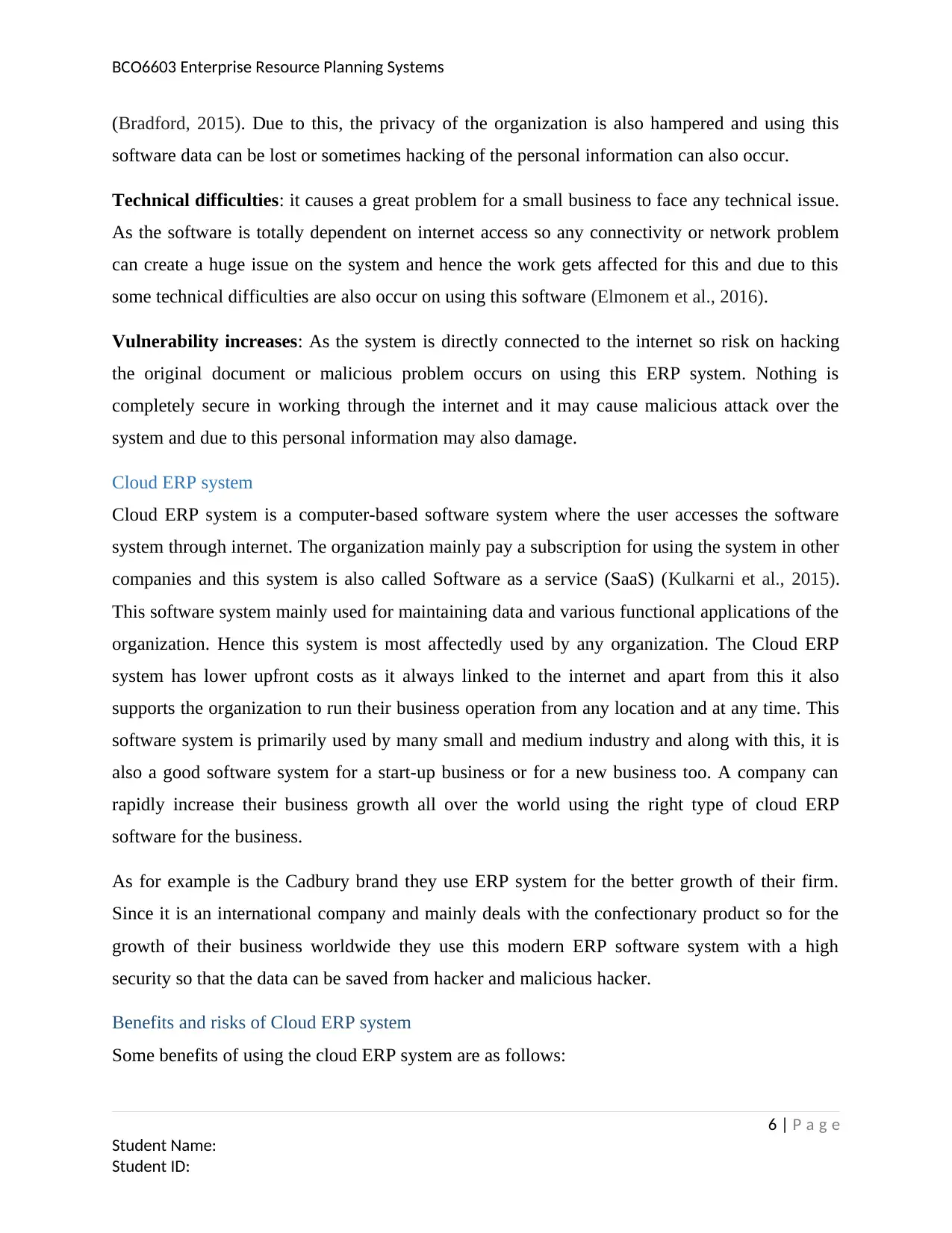
BCO6603 Enterprise Resource Planning Systems
(Bradford, 2015). Due to this, the privacy of the organization is also hampered and using this
software data can be lost or sometimes hacking of the personal information can also occur.
Technical difficulties: it causes a great problem for a small business to face any technical issue.
As the software is totally dependent on internet access so any connectivity or network problem
can create a huge issue on the system and hence the work gets affected for this and due to this
some technical difficulties are also occur on using this software (Elmonem et al., 2016).
Vulnerability increases: As the system is directly connected to the internet so risk on hacking
the original document or malicious problem occurs on using this ERP system. Nothing is
completely secure in working through the internet and it may cause malicious attack over the
system and due to this personal information may also damage.
Cloud ERP system
Cloud ERP system is a computer-based software system where the user accesses the software
system through internet. The organization mainly pay a subscription for using the system in other
companies and this system is also called Software as a service (SaaS) (Kulkarni et al., 2015).
This software system mainly used for maintaining data and various functional applications of the
organization. Hence this system is most affectedly used by any organization. The Cloud ERP
system has lower upfront costs as it always linked to the internet and apart from this it also
supports the organization to run their business operation from any location and at any time. This
software system is primarily used by many small and medium industry and along with this, it is
also a good software system for a start-up business or for a new business too. A company can
rapidly increase their business growth all over the world using the right type of cloud ERP
software for the business.
As for example is the Cadbury brand they use ERP system for the better growth of their firm.
Since it is an international company and mainly deals with the confectionary product so for the
growth of their business worldwide they use this modern ERP software system with a high
security so that the data can be saved from hacker and malicious hacker.
Benefits and risks of Cloud ERP system
Some benefits of using the cloud ERP system are as follows:
6 | P a g e
Student Name:
Student ID:
(Bradford, 2015). Due to this, the privacy of the organization is also hampered and using this
software data can be lost or sometimes hacking of the personal information can also occur.
Technical difficulties: it causes a great problem for a small business to face any technical issue.
As the software is totally dependent on internet access so any connectivity or network problem
can create a huge issue on the system and hence the work gets affected for this and due to this
some technical difficulties are also occur on using this software (Elmonem et al., 2016).
Vulnerability increases: As the system is directly connected to the internet so risk on hacking
the original document or malicious problem occurs on using this ERP system. Nothing is
completely secure in working through the internet and it may cause malicious attack over the
system and due to this personal information may also damage.
Cloud ERP system
Cloud ERP system is a computer-based software system where the user accesses the software
system through internet. The organization mainly pay a subscription for using the system in other
companies and this system is also called Software as a service (SaaS) (Kulkarni et al., 2015).
This software system mainly used for maintaining data and various functional applications of the
organization. Hence this system is most affectedly used by any organization. The Cloud ERP
system has lower upfront costs as it always linked to the internet and apart from this it also
supports the organization to run their business operation from any location and at any time. This
software system is primarily used by many small and medium industry and along with this, it is
also a good software system for a start-up business or for a new business too. A company can
rapidly increase their business growth all over the world using the right type of cloud ERP
software for the business.
As for example is the Cadbury brand they use ERP system for the better growth of their firm.
Since it is an international company and mainly deals with the confectionary product so for the
growth of their business worldwide they use this modern ERP software system with a high
security so that the data can be saved from hacker and malicious hacker.
Benefits and risks of Cloud ERP system
Some benefits of using the cloud ERP system are as follows:
6 | P a g e
Student Name:
Student ID:
Paraphrase This Document
Need a fresh take? Get an instant paraphrase of this document with our AI Paraphraser
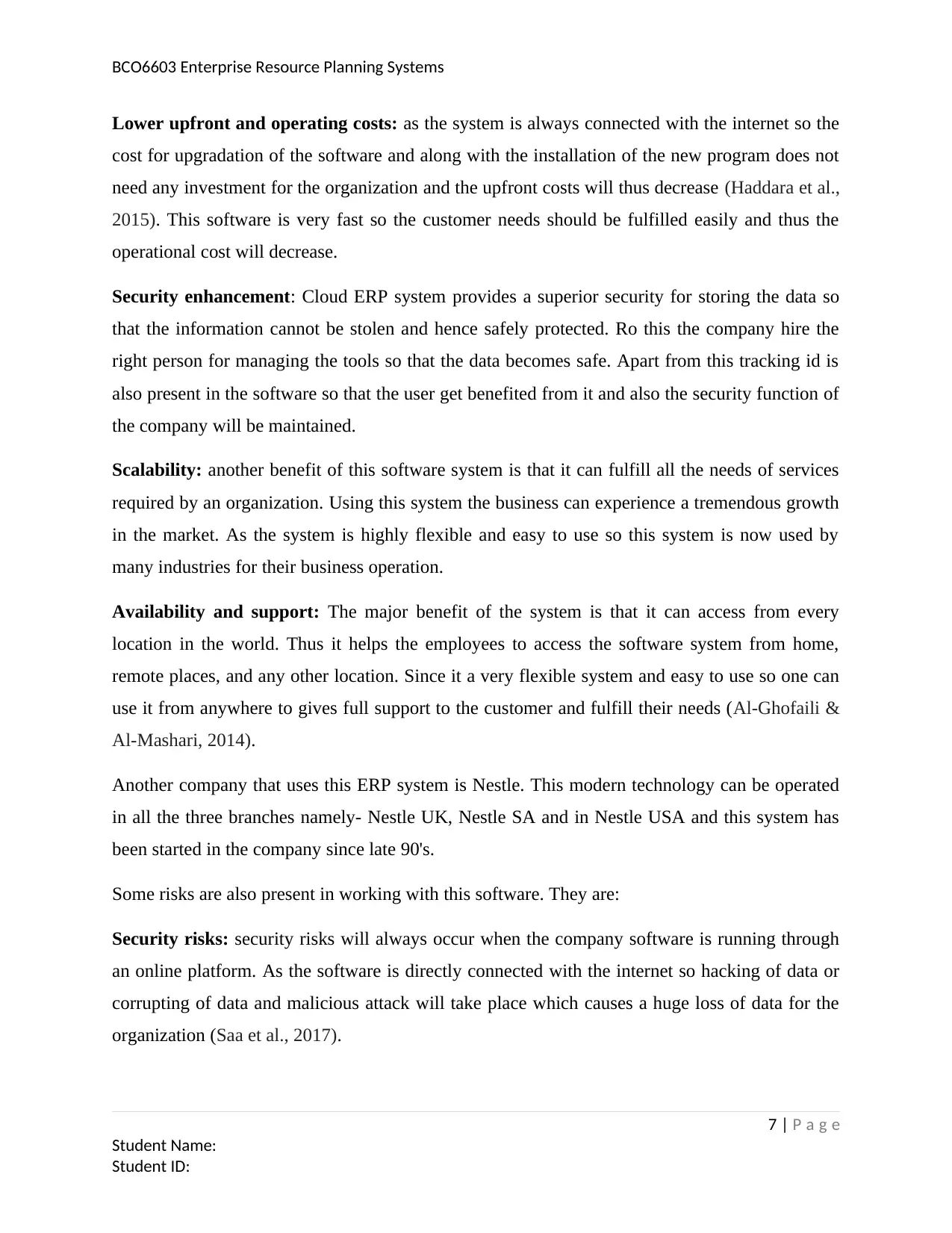
BCO6603 Enterprise Resource Planning Systems
Lower upfront and operating costs: as the system is always connected with the internet so the
cost for upgradation of the software and along with the installation of the new program does not
need any investment for the organization and the upfront costs will thus decrease (Haddara et al.,
2015). This software is very fast so the customer needs should be fulfilled easily and thus the
operational cost will decrease.
Security enhancement: Cloud ERP system provides a superior security for storing the data so
that the information cannot be stolen and hence safely protected. Ro this the company hire the
right person for managing the tools so that the data becomes safe. Apart from this tracking id is
also present in the software so that the user get benefited from it and also the security function of
the company will be maintained.
Scalability: another benefit of this software system is that it can fulfill all the needs of services
required by an organization. Using this system the business can experience a tremendous growth
in the market. As the system is highly flexible and easy to use so this system is now used by
many industries for their business operation.
Availability and support: The major benefit of the system is that it can access from every
location in the world. Thus it helps the employees to access the software system from home,
remote places, and any other location. Since it a very flexible system and easy to use so one can
use it from anywhere to gives full support to the customer and fulfill their needs (Al-Ghofaili &
Al-Mashari, 2014).
Another company that uses this ERP system is Nestle. This modern technology can be operated
in all the three branches namely- Nestle UK, Nestle SA and in Nestle USA and this system has
been started in the company since late 90's.
Some risks are also present in working with this software. They are:
Security risks: security risks will always occur when the company software is running through
an online platform. As the software is directly connected with the internet so hacking of data or
corrupting of data and malicious attack will take place which causes a huge loss of data for the
organization (Saa et al., 2017).
7 | P a g e
Student Name:
Student ID:
Lower upfront and operating costs: as the system is always connected with the internet so the
cost for upgradation of the software and along with the installation of the new program does not
need any investment for the organization and the upfront costs will thus decrease (Haddara et al.,
2015). This software is very fast so the customer needs should be fulfilled easily and thus the
operational cost will decrease.
Security enhancement: Cloud ERP system provides a superior security for storing the data so
that the information cannot be stolen and hence safely protected. Ro this the company hire the
right person for managing the tools so that the data becomes safe. Apart from this tracking id is
also present in the software so that the user get benefited from it and also the security function of
the company will be maintained.
Scalability: another benefit of this software system is that it can fulfill all the needs of services
required by an organization. Using this system the business can experience a tremendous growth
in the market. As the system is highly flexible and easy to use so this system is now used by
many industries for their business operation.
Availability and support: The major benefit of the system is that it can access from every
location in the world. Thus it helps the employees to access the software system from home,
remote places, and any other location. Since it a very flexible system and easy to use so one can
use it from anywhere to gives full support to the customer and fulfill their needs (Al-Ghofaili &
Al-Mashari, 2014).
Another company that uses this ERP system is Nestle. This modern technology can be operated
in all the three branches namely- Nestle UK, Nestle SA and in Nestle USA and this system has
been started in the company since late 90's.
Some risks are also present in working with this software. They are:
Security risks: security risks will always occur when the company software is running through
an online platform. As the software is directly connected with the internet so hacking of data or
corrupting of data and malicious attack will take place which causes a huge loss of data for the
organization (Saa et al., 2017).
7 | P a g e
Student Name:
Student ID:
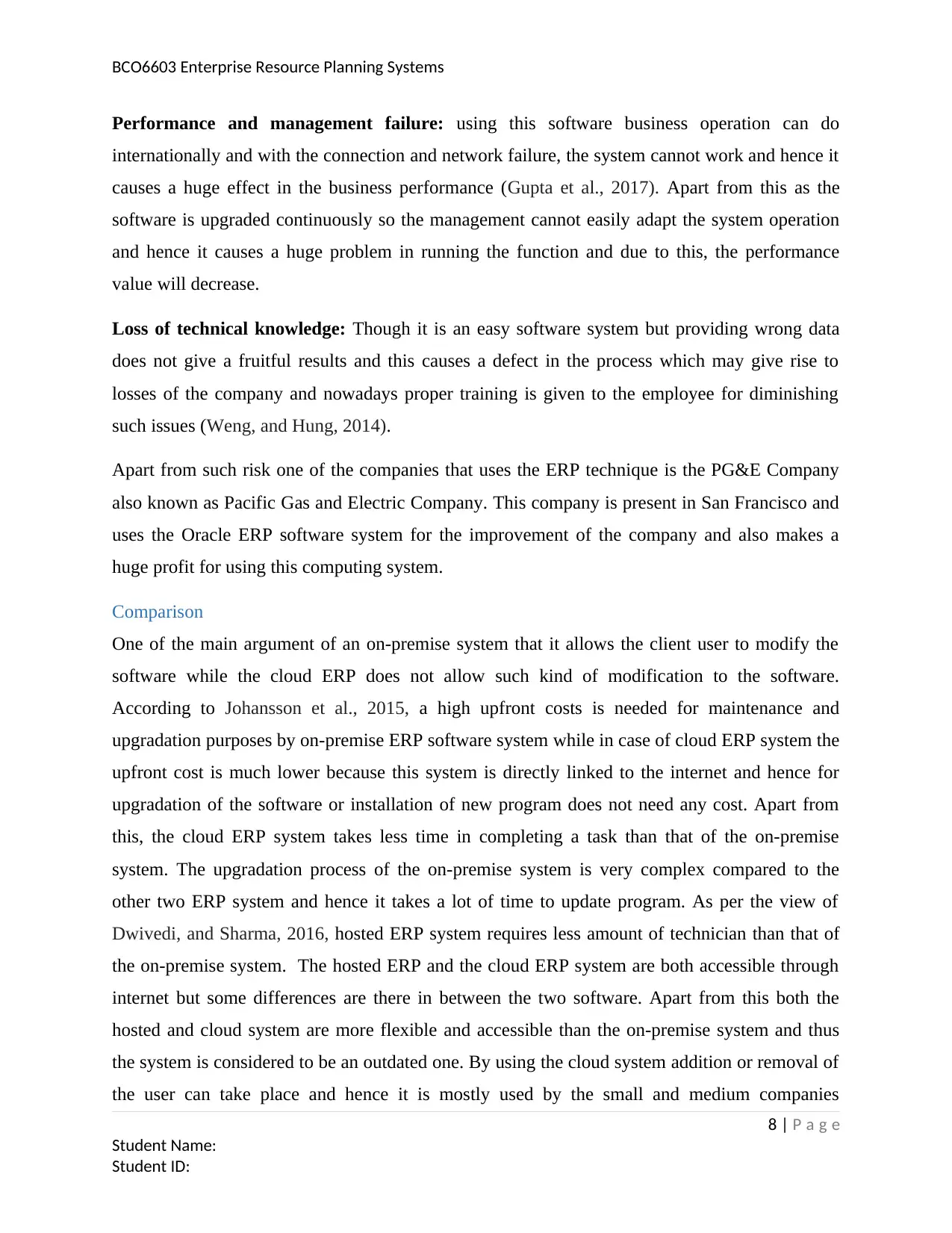
BCO6603 Enterprise Resource Planning Systems
Performance and management failure: using this software business operation can do
internationally and with the connection and network failure, the system cannot work and hence it
causes a huge effect in the business performance (Gupta et al., 2017). Apart from this as the
software is upgraded continuously so the management cannot easily adapt the system operation
and hence it causes a huge problem in running the function and due to this, the performance
value will decrease.
Loss of technical knowledge: Though it is an easy software system but providing wrong data
does not give a fruitful results and this causes a defect in the process which may give rise to
losses of the company and nowadays proper training is given to the employee for diminishing
such issues (Weng, and Hung, 2014).
Apart from such risk one of the companies that uses the ERP technique is the PG&E Company
also known as Pacific Gas and Electric Company. This company is present in San Francisco and
uses the Oracle ERP software system for the improvement of the company and also makes a
huge profit for using this computing system.
Comparison
One of the main argument of an on-premise system that it allows the client user to modify the
software while the cloud ERP does not allow such kind of modification to the software.
According to Johansson et al., 2015, a high upfront costs is needed for maintenance and
upgradation purposes by on-premise ERP software system while in case of cloud ERP system the
upfront cost is much lower because this system is directly linked to the internet and hence for
upgradation of the software or installation of new program does not need any cost. Apart from
this, the cloud ERP system takes less time in completing a task than that of the on-premise
system. The upgradation process of the on-premise system is very complex compared to the
other two ERP system and hence it takes a lot of time to update program. As per the view of
Dwivedi, and Sharma, 2016, hosted ERP system requires less amount of technician than that of
the on-premise system. The hosted ERP and the cloud ERP system are both accessible through
internet but some differences are there in between the two software. Apart from this both the
hosted and cloud system are more flexible and accessible than the on-premise system and thus
the system is considered to be an outdated one. By using the cloud system addition or removal of
the user can take place and hence it is mostly used by the small and medium companies
8 | P a g e
Student Name:
Student ID:
Performance and management failure: using this software business operation can do
internationally and with the connection and network failure, the system cannot work and hence it
causes a huge effect in the business performance (Gupta et al., 2017). Apart from this as the
software is upgraded continuously so the management cannot easily adapt the system operation
and hence it causes a huge problem in running the function and due to this, the performance
value will decrease.
Loss of technical knowledge: Though it is an easy software system but providing wrong data
does not give a fruitful results and this causes a defect in the process which may give rise to
losses of the company and nowadays proper training is given to the employee for diminishing
such issues (Weng, and Hung, 2014).
Apart from such risk one of the companies that uses the ERP technique is the PG&E Company
also known as Pacific Gas and Electric Company. This company is present in San Francisco and
uses the Oracle ERP software system for the improvement of the company and also makes a
huge profit for using this computing system.
Comparison
One of the main argument of an on-premise system that it allows the client user to modify the
software while the cloud ERP does not allow such kind of modification to the software.
According to Johansson et al., 2015, a high upfront costs is needed for maintenance and
upgradation purposes by on-premise ERP software system while in case of cloud ERP system the
upfront cost is much lower because this system is directly linked to the internet and hence for
upgradation of the software or installation of new program does not need any cost. Apart from
this, the cloud ERP system takes less time in completing a task than that of the on-premise
system. The upgradation process of the on-premise system is very complex compared to the
other two ERP system and hence it takes a lot of time to update program. As per the view of
Dwivedi, and Sharma, 2016, hosted ERP system requires less amount of technician than that of
the on-premise system. The hosted ERP and the cloud ERP system are both accessible through
internet but some differences are there in between the two software. Apart from this both the
hosted and cloud system are more flexible and accessible than the on-premise system and thus
the system is considered to be an outdated one. By using the cloud system addition or removal of
the user can take place and hence it is mostly used by the small and medium companies
8 | P a g e
Student Name:
Student ID:
⊘ This is a preview!⊘
Do you want full access?
Subscribe today to unlock all pages.

Trusted by 1+ million students worldwide
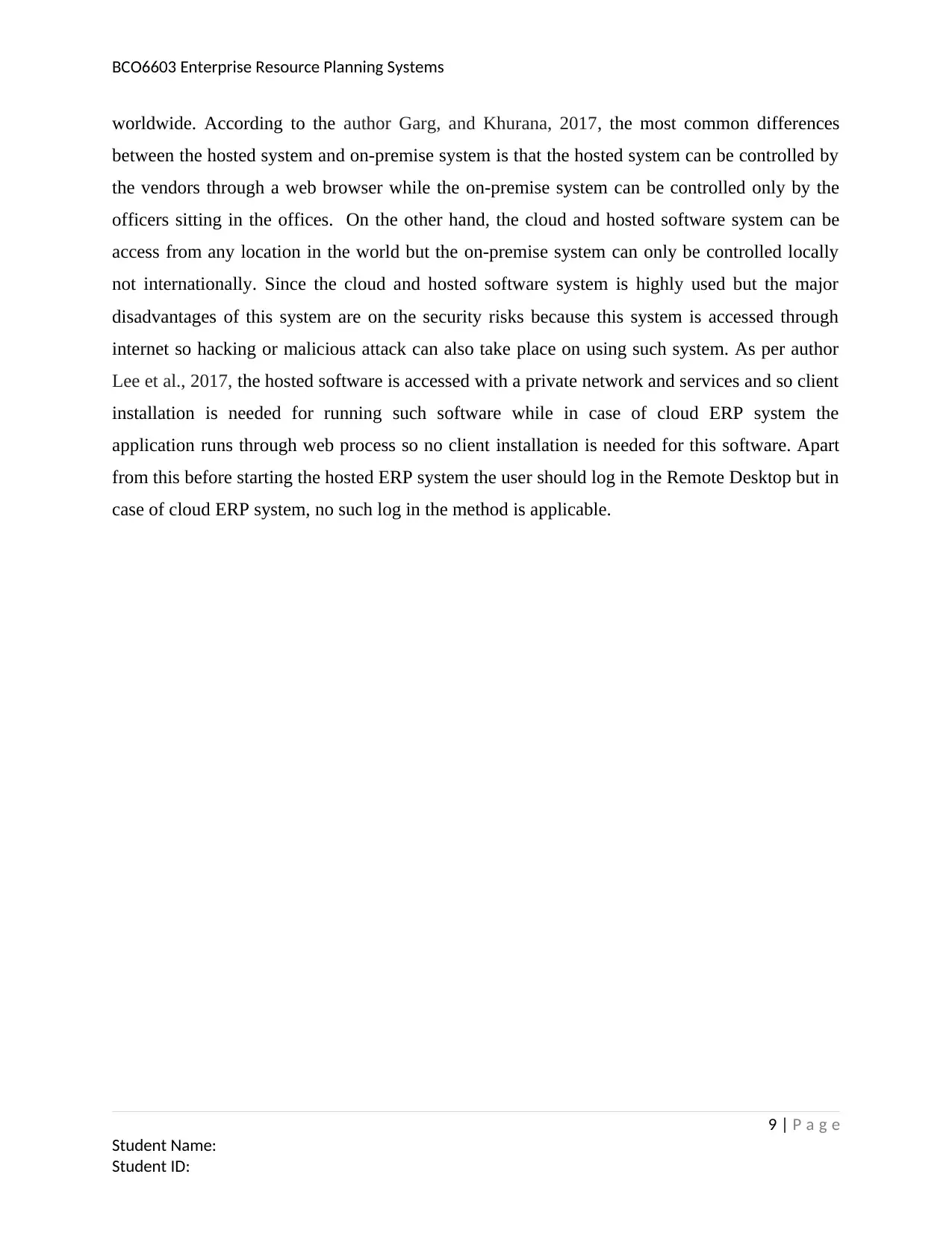
BCO6603 Enterprise Resource Planning Systems
worldwide. According to the author Garg, and Khurana, 2017, the most common differences
between the hosted system and on-premise system is that the hosted system can be controlled by
the vendors through a web browser while the on-premise system can be controlled only by the
officers sitting in the offices. On the other hand, the cloud and hosted software system can be
access from any location in the world but the on-premise system can only be controlled locally
not internationally. Since the cloud and hosted software system is highly used but the major
disadvantages of this system are on the security risks because this system is accessed through
internet so hacking or malicious attack can also take place on using such system. As per author
Lee et al., 2017, the hosted software is accessed with a private network and services and so client
installation is needed for running such software while in case of cloud ERP system the
application runs through web process so no client installation is needed for this software. Apart
from this before starting the hosted ERP system the user should log in the Remote Desktop but in
case of cloud ERP system, no such log in the method is applicable.
9 | P a g e
Student Name:
Student ID:
worldwide. According to the author Garg, and Khurana, 2017, the most common differences
between the hosted system and on-premise system is that the hosted system can be controlled by
the vendors through a web browser while the on-premise system can be controlled only by the
officers sitting in the offices. On the other hand, the cloud and hosted software system can be
access from any location in the world but the on-premise system can only be controlled locally
not internationally. Since the cloud and hosted software system is highly used but the major
disadvantages of this system are on the security risks because this system is accessed through
internet so hacking or malicious attack can also take place on using such system. As per author
Lee et al., 2017, the hosted software is accessed with a private network and services and so client
installation is needed for running such software while in case of cloud ERP system the
application runs through web process so no client installation is needed for this software. Apart
from this before starting the hosted ERP system the user should log in the Remote Desktop but in
case of cloud ERP system, no such log in the method is applicable.
9 | P a g e
Student Name:
Student ID:
Paraphrase This Document
Need a fresh take? Get an instant paraphrase of this document with our AI Paraphraser
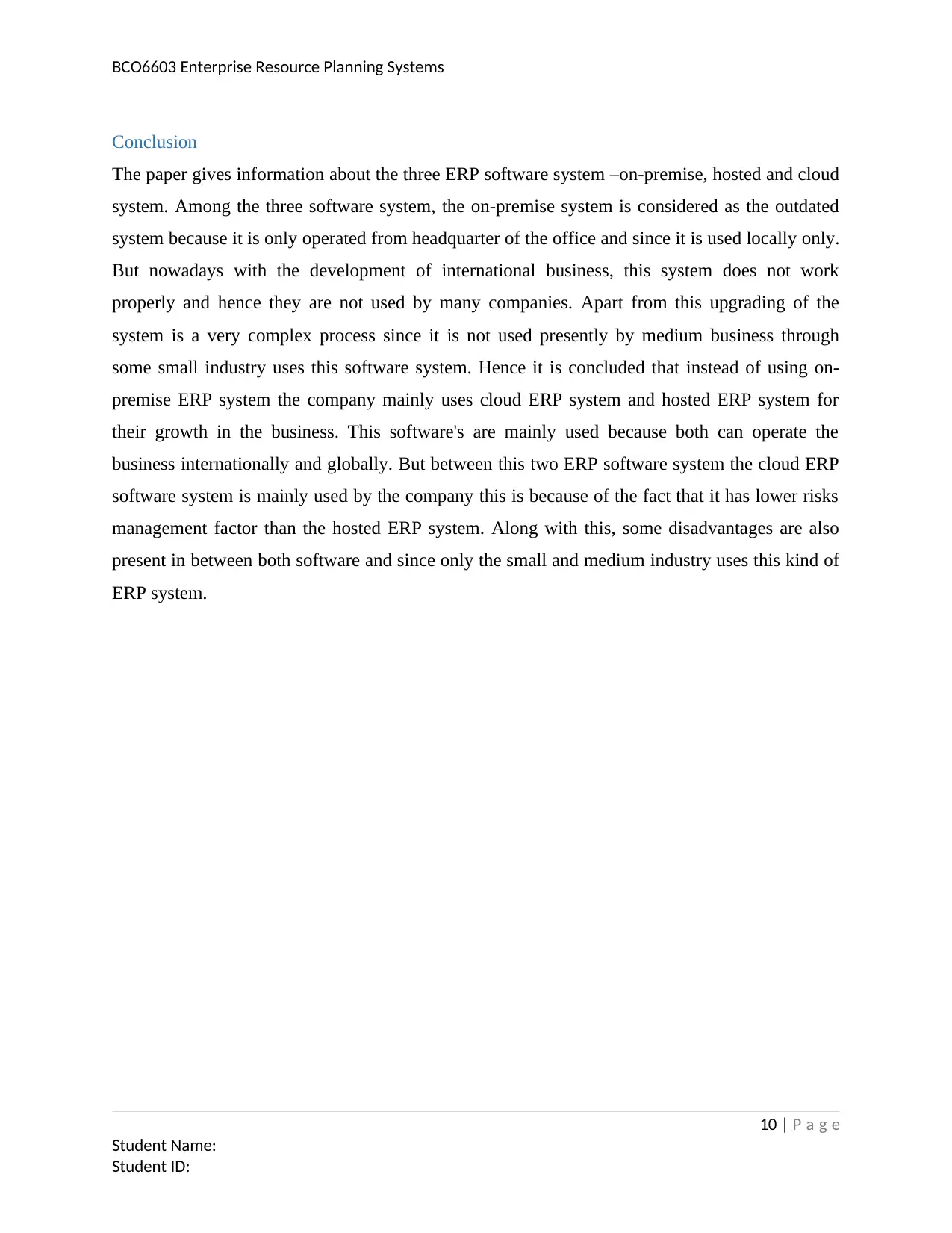
BCO6603 Enterprise Resource Planning Systems
Conclusion
The paper gives information about the three ERP software system –on-premise, hosted and cloud
system. Among the three software system, the on-premise system is considered as the outdated
system because it is only operated from headquarter of the office and since it is used locally only.
But nowadays with the development of international business, this system does not work
properly and hence they are not used by many companies. Apart from this upgrading of the
system is a very complex process since it is not used presently by medium business through
some small industry uses this software system. Hence it is concluded that instead of using on-
premise ERP system the company mainly uses cloud ERP system and hosted ERP system for
their growth in the business. This software's are mainly used because both can operate the
business internationally and globally. But between this two ERP software system the cloud ERP
software system is mainly used by the company this is because of the fact that it has lower risks
management factor than the hosted ERP system. Along with this, some disadvantages are also
present in between both software and since only the small and medium industry uses this kind of
ERP system.
10 | P a g e
Student Name:
Student ID:
Conclusion
The paper gives information about the three ERP software system –on-premise, hosted and cloud
system. Among the three software system, the on-premise system is considered as the outdated
system because it is only operated from headquarter of the office and since it is used locally only.
But nowadays with the development of international business, this system does not work
properly and hence they are not used by many companies. Apart from this upgrading of the
system is a very complex process since it is not used presently by medium business through
some small industry uses this software system. Hence it is concluded that instead of using on-
premise ERP system the company mainly uses cloud ERP system and hosted ERP system for
their growth in the business. This software's are mainly used because both can operate the
business internationally and globally. But between this two ERP software system the cloud ERP
software system is mainly used by the company this is because of the fact that it has lower risks
management factor than the hosted ERP system. Along with this, some disadvantages are also
present in between both software and since only the small and medium industry uses this kind of
ERP system.
10 | P a g e
Student Name:
Student ID:
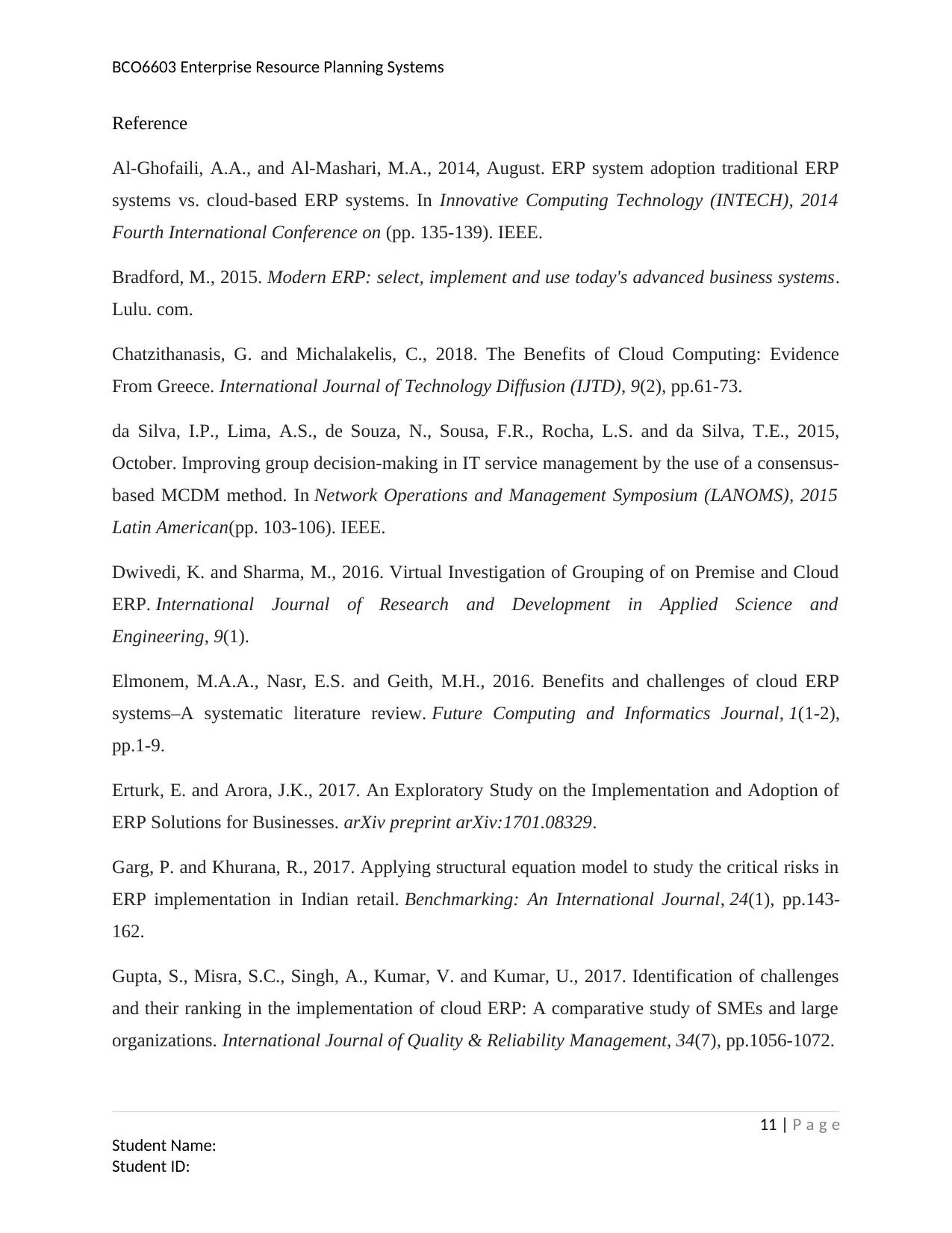
BCO6603 Enterprise Resource Planning Systems
Reference
Al-Ghofaili, A.A., and Al-Mashari, M.A., 2014, August. ERP system adoption traditional ERP
systems vs. cloud-based ERP systems. In Innovative Computing Technology (INTECH), 2014
Fourth International Conference on (pp. 135-139). IEEE.
Bradford, M., 2015. Modern ERP: select, implement and use today's advanced business systems.
Lulu. com.
Chatzithanasis, G. and Michalakelis, C., 2018. The Benefits of Cloud Computing: Evidence
From Greece. International Journal of Technology Diffusion (IJTD), 9(2), pp.61-73.
da Silva, I.P., Lima, A.S., de Souza, N., Sousa, F.R., Rocha, L.S. and da Silva, T.E., 2015,
October. Improving group decision-making in IT service management by the use of a consensus-
based MCDM method. In Network Operations and Management Symposium (LANOMS), 2015
Latin American(pp. 103-106). IEEE.
Dwivedi, K. and Sharma, M., 2016. Virtual Investigation of Grouping of on Premise and Cloud
ERP. International Journal of Research and Development in Applied Science and
Engineering, 9(1).
Elmonem, M.A.A., Nasr, E.S. and Geith, M.H., 2016. Benefits and challenges of cloud ERP
systems–A systematic literature review. Future Computing and Informatics Journal, 1(1-2),
pp.1-9.
Erturk, E. and Arora, J.K., 2017. An Exploratory Study on the Implementation and Adoption of
ERP Solutions for Businesses. arXiv preprint arXiv:1701.08329.
Garg, P. and Khurana, R., 2017. Applying structural equation model to study the critical risks in
ERP implementation in Indian retail. Benchmarking: An International Journal, 24(1), pp.143-
162.
Gupta, S., Misra, S.C., Singh, A., Kumar, V. and Kumar, U., 2017. Identification of challenges
and their ranking in the implementation of cloud ERP: A comparative study of SMEs and large
organizations. International Journal of Quality & Reliability Management, 34(7), pp.1056-1072.
11 | P a g e
Student Name:
Student ID:
Reference
Al-Ghofaili, A.A., and Al-Mashari, M.A., 2014, August. ERP system adoption traditional ERP
systems vs. cloud-based ERP systems. In Innovative Computing Technology (INTECH), 2014
Fourth International Conference on (pp. 135-139). IEEE.
Bradford, M., 2015. Modern ERP: select, implement and use today's advanced business systems.
Lulu. com.
Chatzithanasis, G. and Michalakelis, C., 2018. The Benefits of Cloud Computing: Evidence
From Greece. International Journal of Technology Diffusion (IJTD), 9(2), pp.61-73.
da Silva, I.P., Lima, A.S., de Souza, N., Sousa, F.R., Rocha, L.S. and da Silva, T.E., 2015,
October. Improving group decision-making in IT service management by the use of a consensus-
based MCDM method. In Network Operations and Management Symposium (LANOMS), 2015
Latin American(pp. 103-106). IEEE.
Dwivedi, K. and Sharma, M., 2016. Virtual Investigation of Grouping of on Premise and Cloud
ERP. International Journal of Research and Development in Applied Science and
Engineering, 9(1).
Elmonem, M.A.A., Nasr, E.S. and Geith, M.H., 2016. Benefits and challenges of cloud ERP
systems–A systematic literature review. Future Computing and Informatics Journal, 1(1-2),
pp.1-9.
Erturk, E. and Arora, J.K., 2017. An Exploratory Study on the Implementation and Adoption of
ERP Solutions for Businesses. arXiv preprint arXiv:1701.08329.
Garg, P. and Khurana, R., 2017. Applying structural equation model to study the critical risks in
ERP implementation in Indian retail. Benchmarking: An International Journal, 24(1), pp.143-
162.
Gupta, S., Misra, S.C., Singh, A., Kumar, V. and Kumar, U., 2017. Identification of challenges
and their ranking in the implementation of cloud ERP: A comparative study of SMEs and large
organizations. International Journal of Quality & Reliability Management, 34(7), pp.1056-1072.
11 | P a g e
Student Name:
Student ID:
⊘ This is a preview!⊘
Do you want full access?
Subscribe today to unlock all pages.

Trusted by 1+ million students worldwide
1 out of 14
Related Documents
Your All-in-One AI-Powered Toolkit for Academic Success.
+13062052269
info@desklib.com
Available 24*7 on WhatsApp / Email
![[object Object]](/_next/static/media/star-bottom.7253800d.svg)
Unlock your academic potential
Copyright © 2020–2026 A2Z Services. All Rights Reserved. Developed and managed by ZUCOL.



